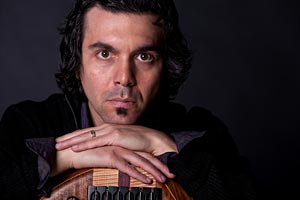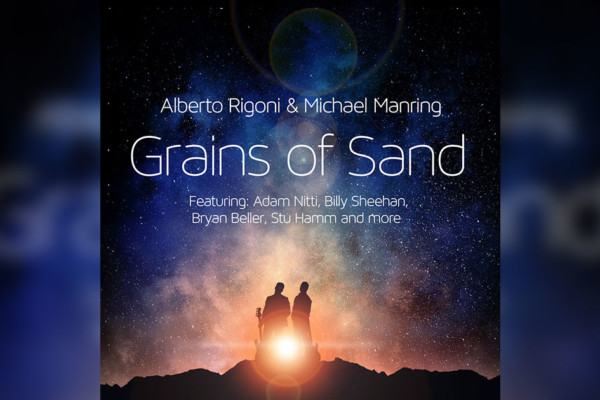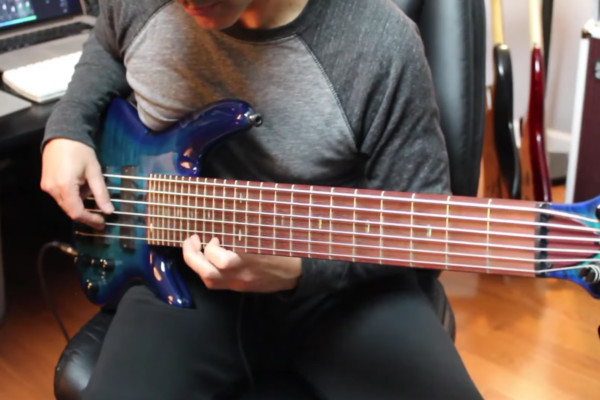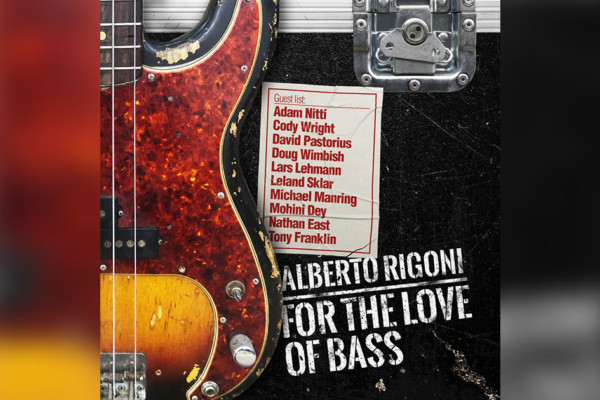An Interview with Adam Nitti
 Rounding out our interviews from the Gerald Veasley Bass Boot Camp is our conversation with Adam Nitti. Based in Nashville, the bassist and educator has run the gamut of the music industry, from session work to touring to producing to teaching and more. His credits include working with artists like the Dave Weckl Band, Steven Curtis Chapman, Susan Tedeschi, Mandisa, the Jeff Coffin Mu-tet, Casting Crowns, Victor Wooten, and more.
Rounding out our interviews from the Gerald Veasley Bass Boot Camp is our conversation with Adam Nitti. Based in Nashville, the bassist and educator has run the gamut of the music industry, from session work to touring to producing to teaching and more. His credits include working with artists like the Dave Weckl Band, Steven Curtis Chapman, Susan Tedeschi, Mandisa, the Jeff Coffin Mu-tet, Casting Crowns, Victor Wooten, and more.
Nitti has been a pillar of Veasley’s Bass Boot Camp, having only missed one year of its ten year history. After sharing his diverse talents with students, we got to quiz him about the camp, his lessons, and what it takes to make it in the music industry.
How many camps have you come to?
I think that this is my ninth. We were trying to figure that out just the other night. I missed one. It may have been the first one, before I even met Gerald, but I’ve been a somewhat permanent fixture here for a while.
How did you get hooked up with this camp?
Honestly I don’t remember the first time that I met Gerald initially, but through the whole network of being at different camps and different events like this, over time you come to meet a lot of people. Gerald invited me to teach early on, and of course I was super excited about it and honored to be a part of it. It’s one of the events that I look forward to the most every year.
You’ve taught at many other camps. What makes this one special?
Every camp that I’ve been to kind of has its own thing. The neat thing about Gerald’s camp is there’s just a really interesting vibe that occurs here. There’s this extra special sense of positivity and camaraderie amongst all of the students and instructors. I don’t think it’s an overstatement to say it’s the type of environment where people leave here very often with their lives transformed, not just their bass playing transformed, and that’s really exciting to see.
Almost like a spiritual thing?
It is for me. A lot of it you really can’t put into words. There’s a transformation that occurs underneath. I think some of the most important stuff that we share here is that there is a philosophy of music. There is a philosophy of sharing and giving your talents away and giving back. It seems to be a running theme here. Figuring out what you can do to make yourself more of a conduit for the music and sharing it with the world, and that’s really powerful.
What do you cover in your sessions?
All of the instructors have rotations, and the student class is divided into beginning, intermediate and advanced groups. All of the instructors get to see all of the groups throughout the weekend. This particular weekend with the beginning students, I was going over the basics about how to play the instrument and the actual mechanics of playing the instrument. Helping people to not get into bad habits and hopefully showing them things that will allow them to play for a very very long time without suffering from injury or fatigue or anything like that… really getting into the nuts and bolts of how to play correctly.
With the intermediate students, we covered a little bit of what I would call “intermediate harmony”. We talked a lot about the relationship between scales and chords, where those components come from, what they mean in music, and how you’re supposed to react to these components specifically. So really the application of those concepts.
With the advanced class, we get more into heavy improvisational tactics and things that you can do to actually create a larger variety of different moods, colors and emotions when you play just based on eliminating certain notes or including certain notes into you phrasing.
So there’s something for everybody.
Of course not everybody is at the same level in each of the classes, so we try to present some concepts that would apply in a variety of different musical scenarios for them.
What reactions and responses have you gotten from campers?
Well, so far so good. If they don’t like my classes, they haven’t told me to my face [laughs]. The overwhelming feedback from the students for all the teachers classes is positive. They’re getting things here that they wouldn’t just get anywhere else. We try to incorporate the concept of having an identity into what we teach, and that’s something I think about a lot. You can train bass players in a purely academic sense to where all they’re learning are the mathematical pieces of the music… learning scales, modes, chords, or whatever. You can teach that, but to go beyond that and actually put a player on the path to actually finding their own identity and their own true voice on the instrument, that for me is the greatest challenge and also the most rewarding thing to see. You don’t necessarily see that over night or over a three day period as you have here in camp, but the coolest thing is seeing the students from prior camps who come back and share some of their positive news of how they’ve grown as a player since they’ve been in your class. That’s really exciting.
You’ve been very successful as a recording guy, as a touring guy, an educator… You’re doing a lot and you’re making it through as the industry is changing. You’re teaching a lot of young people. What would you tell them to focus on in this changing world? What’s going to give them some hope and good advice on what they should be doing?
Well, I can only speak from my experience on it, but as things have changed for me over the past several years, I’ve been very grateful that I am involved in many different types of things. If I was only trying to do sessions, or I was only trying to do education, or only trying to do tours, it may be harder to balance that income stream. But what’s nice about being able to do many different things and trying to be involved in many different facets of the industry is that even if any one of those things becomes turbulent as far as it’s reliability, you’ve got kind of the other facets balancing it out.
My advice to upcoming player would be, don’t necessarily get caught up in going in just one particular direction. Try to be as versatile as you can. Obviously, if your passion is the bass, there is nothing wrong with basing what you do around your bass playing aspirations. But maybe think about expanding your horizons to also think about doing things like writing music. Get into writing music if you’ve never done that before. Learn how to record your bass, and do very basic recording and engineering. Learn as much as you can about music theory. You might try teaching somebody a lesson, even if it’s just completely informal, try sharing information with another player. Be open. If there’s a certain style of music that is your favorite, be open to learning other styles of music as well.
All of these things that you can do will enrich you as a player and as a person, but also make you more marketable. Another thing that’s important: learn how to sing, if you’re not singing already. One thing is – and this definitely is the case in Nashville and I’m sure is the case in other cities as well – if you can sing background vocals, your value suddenly shoots up exponentially. It’s one thing to be able to play great bass, but if you’re working at the pro level, the bass playing is almost taken for granted. You almost have to separate yourself from the others with the other skill sets you have. So things like learning how to sing [really help you]. If you can’t sing, work on your singing craft.
Another thing is being able to play keyboard bass. Some people don’t think about it, but in certain musical scenarios, the bass is played on a synth. Think about being able to do that as well, so that it’s yet another tool you have in the shed that you can offer to the industry that makes you that much more valuable and desirable for people to have you be a part of your situation.
Tell us about your new Music Dojo project.
I just opened up a little music academy called Music Dojo Nashville, and I have an online site that I co-founded many years ago called MusicDojo.com, which offer online interactive courses. My school is a small academy that is mostly catering to bass players, but our vision is much wider than just bass. The idea is that people can go there to study bass, but they also can experience masterclasses and clinics and seminars from other music professionals in the industry covering such things as recording, engineering, songwriting… you name it. The idea is to try to establish a sense of community there among Nashville players that’s not just limited to bass players. Of course, I have a special affinity for bass players, being one myself, and that’s mostly my specialty as far as music education goes. My vision is one that goes far beyond just bass alone.
We’re actually not really directly affiliated with the online site, but the name was definitely inspired by it. When we though about what to call it, we went through a bunch of different names and ideas for concepts, but at the end of the day we kept coming back to Music Dojo. The idea of a dojo, a place where you go shed everything out and you get real serious about getting down to business and improving. So the name stuck. I talked to my business partner with the online site about it, and he thought it was a great idea too because it basically established a brick and mortar location that represented the vision of the original Music Dojo. We’re just getting started but we’ve got all sorts of awesome plans that we’re really excited about.
You teach over Skype as well?
Yeah. I don’t teach a whole lot of private lessons, but the ones that I do teach, the majority of them are over Skype. Quite frankly, I’ve been really surprised at how quickly that’s grown. At the beginning, people weren’t sure that was going to be a completely viable way to study music privately, but I guess as the internet becomes more and more a part of our life, you know the idea of doing things through webcams is more and more accepted. It’s fantastic and convenient for people who aren’t local. I really love how you can reach somebody who maybe lives in a town where they aren’t any bass teachers at all, and they can go online and get a great education.
Then I have just a handful of students who come to the building right now, to the actual Music Dojo facility. We just got started in the middle of January, so we’re really just now laying down roots. The offerings that we’re going to have range everywhere from the masterclasses and clinics that I mentioned before all the way to in-person versions of the online courses that we offer on the Music Dojo site. People will be able to enroll in courses lasting four or five weeks long that cover a particular concept. For example, I might run jazz improvisation for four weeks and it meets Tuesday nights at 7 for an hour and a half for four weeks straight. That sort of a thing, almost like a university environment where there’s a schedule and enrollment process that occurs.
So, getting to your music, you released Liminal in 2009. Did you get a lot of touring behind it?
No, I really only did what would be considered “regional” touring with that. A lot of that is due to the fact that I was touring with some other artists during the time right before and right after it came out. The majority of the gigs that I’ve been doing lately have been more regional things using a variety of different ensemble arrangements. So sometimes we go out with a quartet, sometimes we go out with a quintet, and sometimes it’s a trio. So the arrangements change accordingly. I’m back in writing mode again, and one of my goals this year is that I have an instructional video, the first of a series, that’s getting ready to come out. That will be the very next thing I release. Then after that, I’ll be cutting a live recording with a band which will include some new songs on that as well.
What will the instructional videos be based around?
The first one is going to cover a few different things… one: basic ear training, two: introduction to improvisation, and three: just basic implied harmony and theory. So it’s part one of a series. The aim was not to just create a beginners improv DVD or beginners ear training DVD. It’s very conceptual to where the things that are presented can apply to players from beginning to intermediate level pretty easily. My goal was to try to give people information that they could use to continue teaching themselves, and then I’ll build on that in the DVDs that follow.
And it will be released just as a DVD?
There will be an online version and a DVD version. The DVD version will include some extra content in it that you’ll have to buy separately if you get the online version, but we will have a downloadable version as well.
So what else is coming up for you?
We featured Anthony Wellington for our first [Music Dojo] bass clinic and for the next one we have Victor Wooten coming in on August 17th. I also started a six-week masterclass series on improvisation on July 27th that will be the first of several in a series. We will also offer clinics from other world-class instrumentalists, as well as producers and writers, in an effort to offer exclusive events that aren’t just bass-centered.
For more on Adam, visit his website.



